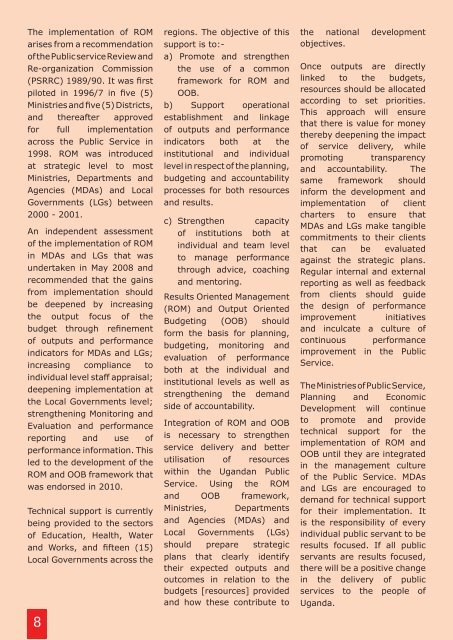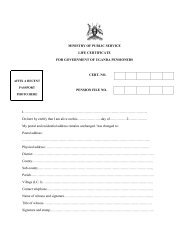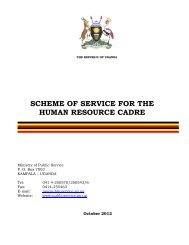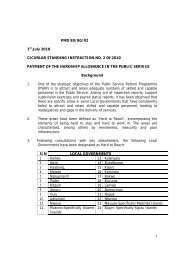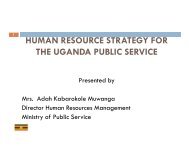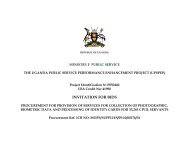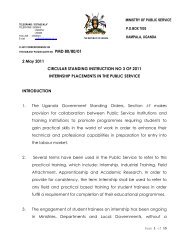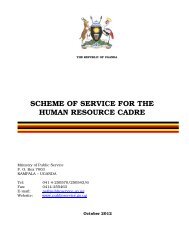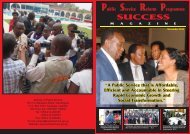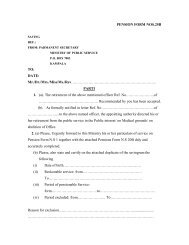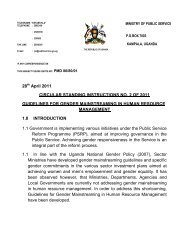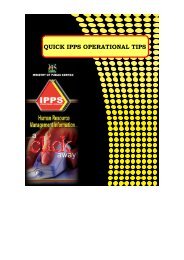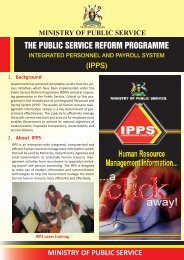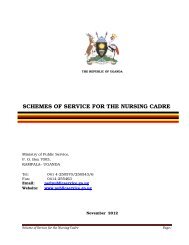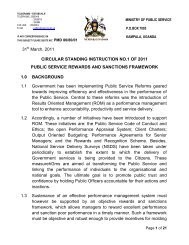Ministry of Public Service Quarterly Bulletin July-September 2012
Ministry of Public Service Quarterly Bulletin July-September 2012
Ministry of Public Service Quarterly Bulletin July-September 2012
- No tags were found...
Create successful ePaper yourself
Turn your PDF publications into a flip-book with our unique Google optimized e-Paper software.
The implementation <strong>of</strong> ROMarises from a recommendation<strong>of</strong> the <strong>Public</strong> service Review andRe-organization Commission(PSRRC) 1989/90. It was firstpiloted in 1996/7 in five (5)Ministries and five (5) Districts,and thereafter approvedfor full implementationacross the <strong>Public</strong> <strong>Service</strong> in1998. ROM was introducedat strategic level to mostMinistries, Departments andAgencies (MDAs) and LocalGovernments (LGs) between2000 - 2001.An independent assessment<strong>of</strong> the implementation <strong>of</strong> ROMin MDAs and LGs that wasundertaken in May 2008 andrecommended that the gainsfrom implementation shouldbe deepened by increasingthe output focus <strong>of</strong> thebudget through refinement<strong>of</strong> outputs and performanceindicators for MDAs and LGs;increasing compliance toindividual level staff appraisal;deepening implementation atthe Local Governments level;strengthening Monitoring andEvaluation and performancereporting and use <strong>of</strong>performance information. Thisled to the development <strong>of</strong> theROM and OOB framework thatwas endorsed in 2010.Technical support is currentlybeing provided to the sectors<strong>of</strong> Education, Health, Waterand Works, and fifteen (15)Local Governments across the8regions. The objective <strong>of</strong> thissupport is to:-a) Promote and strengthenthe use <strong>of</strong> a commonframework for ROM andOOB.b) Support operationalestablishment and linkage<strong>of</strong> outputs and performanceindicators both at theinstitutional and individuallevel in respect <strong>of</strong> the planning,budgeting and accountabilityprocesses for both resourcesand results.c) Strengthen capacity<strong>of</strong> institutions both atindividual and team levelto manage performancethrough advice, coachingand mentoring.Results Oriented Management(ROM) and Output OrientedBudgeting (OOB) shouldform the basis for planning,budgeting, monitoring andevaluation <strong>of</strong> performanceboth at the individual andinstitutional levels as well asstrengthening the demandside <strong>of</strong> accountability.Integration <strong>of</strong> ROM and OOBis necessary to strengthenservice delivery and betterutilisation <strong>of</strong> resourceswithin the Ugandan <strong>Public</strong><strong>Service</strong>. Using the ROMand OOB framework,Ministries,Departmentsand Agencies (MDAs) andLocal Governments (LGs)should prepare strategicplans that clearly identifytheir expected outputs andoutcomes in relation to thebudgets [resources] providedand how these contribute tothe national developmentobjectives.Once outputs are directlylinked to the budgets,resources should be allocatedaccording to set priorities.This approach will ensurethat there is value for moneythereby deepening the impact<strong>of</strong> service delivery, whilepromoting transparencyand accountability. Thesame framework shouldinform the development andimplementation <strong>of</strong> clientcharters to ensure thatMDAs and LGs make tangiblecommitments to their clientsthat can be evaluatedagainst the strategic plans.Regular internal and externalreporting as well as feedbackfrom clients should guidethe design <strong>of</strong> performanceimprovement initiativesand inculcate a culture <strong>of</strong>continuous performanceimprovement in the <strong>Public</strong><strong>Service</strong>.The Ministries <strong>of</strong> <strong>Public</strong> <strong>Service</strong>,Planning and EconomicDevelopment will continueto promote and providetechnical support for theimplementation <strong>of</strong> ROM andOOB until they are integratedin the management culture<strong>of</strong> the <strong>Public</strong> <strong>Service</strong>. MDAsand LGs are encouraged todemand for technical supportfor their implementation. Itis the responsibility <strong>of</strong> everyindividual public servant to beresults focused. If all publicservants are results focused,there will be a positive changein the delivery <strong>of</strong> publicservices to the people <strong>of</strong>Uganda.


